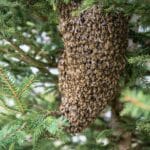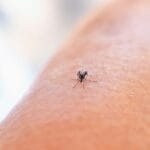Article-at-a-Glance
- Neem oil spray is a safe and effective natural pesticide for your garden.
- Introducing beneficial insects can help manage pest populations naturally.
- Companion planting is a strategic way to deter pests and promote a healthy garden ecosystem.
- Mulching and proper watering are cultural practices that can prevent pest infestations.
- Physical barriers and traps provide direct control of pests without harming the environment.
Embrace the Power of Nature: Effective Pest Control Without the Chemicals
Why Natural Pest Control Matters
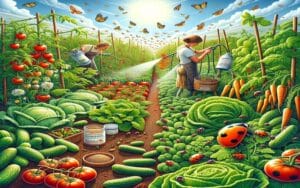
Let’s face it, nobody wants to see their garden overrun by pests. But before you reach for chemical solutions, consider this: natural pest control isn’t just better for the environment, it’s also better for your plants, your soil, and the beneficial organisms that call your garden home. Plus, it keeps those nasty chemicals away from your family and pets. So, why not give Mother Nature a chance to do what she does best?
Top Natural Repellents That Really Work
If you’re ready to take a stand against pests the natural way, you’re in the right place. I’m going to share with you some of the most effective natural repellents that have been proven to work. These aren’t just old wives’ tales; these are methods that harness the power of nature to keep your garden thriving and pest-free.
Designing Your Garden To Deter Pests
When planning your garden layout, consider incorporating strategies from our spring pest-proofing guide to keep your home and garden pest-free.
A smart garden design is your first line of defense against pests. By strategically placing certain plants, you can create a natural barrier that repels pests. It’s all about knowing which plants work as natural deterrents and where to place them for maximum effect. Let’s dig into how you can design your garden to keep pests at bay, naturally.
Proven Natural Repellents for Your Garden
As you prepare for the spring season, it’s important to consider natural pest repellents that can keep your garden free from unwanted visitors.
Neem Oil: The Organic Pesticide
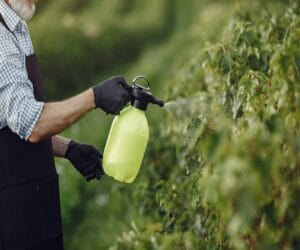
First up, let’s talk about neem oil. Extracted from the seeds of the neem tree, this oil is a powerhouse when it comes to repelling pests. It’s safe, it’s natural, and it’s incredibly effective. Here’s how to use it:
- Mix 2 teaspoons of neem oil with 1 liter of water and a few drops of dish soap to emulsify the oil.
- Shake well and spray it on the affected areas of your plants.
- Apply it once a week or after heavy rain to maintain its effectiveness.
Neem oil works by disrupting the life cycle of pests, preventing them from feeding, maturing, and reproducing. This means that over time, you’ll see a significant reduction in the pest population in your garden.
Remember, while neem oil is non-toxic to birds, animals, and most beneficial insects, it’s always best to apply it in the evening or early morning to avoid harming any friendly pollinators visiting your garden during the day.
Example: A friend of mine was struggling with aphids in her rose garden. After I recommended neem oil, she started spraying her roses every week. Not only did the aphids disappear, but her roses have never looked healthier.
Beneficial Insects: Nature’s Pest Control Agents
While chemical repellents and treatments can be effective, introducing beneficial insects into your garden is a natural and eco-friendly way to control unwanted pests.
It might seem counterintuitive to invite insects into your garden to get rid of pests, but that’s exactly what you should be doing. Beneficial insects are nature’s pest control agents, and they can be your best friends in the fight against unwanted critters.
- Ladybugs feast on aphids and other soft-bodied insects.
- Praying mantises are general predators that tackle a variety of pests.
- Lacewings are particularly good at munching on aphid colonies.
To attract these helpful insects to your garden, you’ll want to plant a variety of flowering plants that provide nectar and pollen. This not only invites beneficial bugs but also promotes biodiversity in your garden. For more information on how to maintain a pest-free environment, consider reading our Spring Pest-Proofing Guide to ensure a pest-free home.
For example, I once helped a community garden infested with spider mites by introducing ladybugs. Within a few weeks, the mites were gone, and the garden was thriving thanks to our tiny spotted allies.
As homeowners prepare for the spring season, it’s crucial to consider pest-proofing measures to ensure a pest-free environment. Proper prevention can save a lot of trouble and expense down the line.
Diatomaceous Earth: The Natural Detox for Your Soil
While diatomaceous earth is widely recognized for its pest control properties, it also plays a crucial role in detoxifying soil, making it an essential component for sustainable gardening.
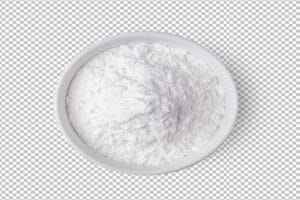
Diatomaceous earth is a fine powder made from the fossilized remains of tiny aquatic organisms called diatoms. Their skeletons are made of a natural substance called silica. When pests come into contact with diatomaceous earth, it absorbs the oils and fats from their cuticles, which dries them out and leads to their demise. But here’s the best part: it’s completely non-toxic to humans and pets.
To use diatomaceous earth effectively, sprinkle it around the base of your plants or on the leaves. It’s important to note that it works when it’s dry, so reapply after watering your plants or after a rain. It’s perfect for dealing with slugs, snails, and other pests that like to munch on your plants.
Essential Oils: Scented Defense Against Pests
Essential oils are not just for aromatherapy; they’re also potent natural insecticides. Certain essential oils, like peppermint, lavender, and eucalyptus, can repel a wide range of pests. Here’s a simple way to make an essential oil spray for your garden:
- Mix a few drops of essential oil with water and a drop of dish soap to help the oil mix with water.
- Shake it up in a spray bottle and mist your plants, focusing on the undersides of the leaves where pests like to hide.
- Reapply every few days or as needed for persistent pests.
This natural repellent is not only effective but also leaves your garden smelling great. However, be sure to test the spray on a small part of the plant first to ensure it doesn’t cause any damage.
Companion Planting: A Strategic Approach to Pest Control
Companion planting is not just about beautifying your garden – it’s a strategic approach that can help in natural pest control. By placing certain plants together, you can deter pests and protect your garden from various insects and diseases naturally.
Plants That Repel Unwanted Insects
Companion planting is the practice of growing certain plants together to benefit one another. Some plants have natural substances in their roots, flowers, or leaves that repel pests and protect their neighbors. Here are a few examples of plants that can help keep pests away:
- Marigolds emit a smell that deters nematodes and other pests.
- Garlic and onions can repel aphids, beetles, and other pests.
- Chrysanthemums contain a natural insecticide called pyrethrin.
When you incorporate these plants into your garden, they act as a natural and sustainable form of pest control, reducing the need for any chemical interventions.
I’ve seen gardens transformed by companion planting. A neighbor planted marigolds among her tomato plants, and not only did it add a splash of color, but she also noticed a significant drop in the number of pests attacking her tomatoes.
Vegetable Companions For Balanced Ecosystems
Companion planting isn’t just about repelling pests; it’s also about creating a balanced ecosystem where plants support each other’s growth. For instance, tall plants like corn can provide shade for lower-growing, shade-loving plants. Beans can fix nitrogen in the soil, which benefits leafy plants like lettuce that need nitrogen to grow.
Cultural Practices: Keeping Your Garden in Top Shape
Implementing effective natural pest control methods is crucial for keeping your garden healthy and thriving. By understanding and applying the right cultural practices, you can prevent many common garden pests from becoming a problem.
Mulching as a Pest Deterrent
Mulching is not only beneficial for soil health but can also serve as an effective natural pest control strategy. By creating a barrier on the soil surface, mulching can help deter various pests that would otherwise harm your garden plants.
Mulching is not only great for retaining moisture and keeping weeds at bay, but it also acts as a physical barrier against pests. Organic mulches can host beneficial insects and spiders that prey on garden pests. Apply a layer of mulch around your plants to help keep them healthy and protected.
Proper Watering Techniques to Prevent Infestations
Ensuring your garden has the right amount of moisture can be key to preventing pest infestations. Over-watering can lead to excess moisture which attracts a variety of pests, while under-watering can stress plants making them more susceptible to attack. For more detailed prevention tips, consider reading our guide on spring pest-proofing.
Believe it or not, the way you water your plants can influence pest infestations. Overwatering can lead to root rot and attract pests that thrive in damp conditions. Conversely, underwatering can stress plants and make them more susceptible to attacks. Water your plants at the base to keep the foliage dry and water in the morning so the sun can dry any excess moisture. For more tips on keeping your home pest-free, check out our spring pest-proofing guide.
It’s not just what you do, but how you do it. A friend of mine switched to watering in the morning instead of the evening, and she noticed a decrease in slugs and other pests that were previously thriving in the moist, cool conditions of her garden at night.
Physical Barriers and Traps: Direct Action Against Pests
Implementing natural pest control methods can be highly effective in safeguarding your garden from unwanted insects and critters. Physical barriers and traps are a direct action strategy that can protect your plants without the use of harmful chemicals.
Setting Up Protective Garden Netting

While setting up protective garden netting is a great way to keep pests out, it’s also important to consider other pest-proofing strategies to ensure a pest-free environment.
Sometimes the best way to protect your plants is to put up a physical barrier. Garden netting can prevent birds, butterflies, and other larger pests from getting to your plants. It’s an easy and non-toxic way to keep your garden safe.
Diverse Trapping Techniques for Different Pests
When dealing with a termite infestation, it’s important to consider the variety of trapping techniques available. For homeowners looking to tackle this issue, understanding the early signs and detection methods can be crucial in preventing further damage.
Different pests require different trapping techniques. For example, yellow sticky traps can catch flying insects like aphids and whiteflies, while a simple beer trap can lure and drown slugs. Remember, traps should be used as part of an integrated pest management approach and not as the sole method of control.
FAQ: Your Questions on Natural Pest Control Answered
As we wrap up our guide on natural pest control, let’s tackle some frequently asked questions that might be buzzing in your mind. Armed with these answers, you’ll be well on your way to creating a more natural, pest-resistant garden.
What Are the Best Natural Insecticides for Vegetable Gardens?

The best natural insecticides for vegetable gardens are those that are safe for the plants, effective against pests, and pose no harm to humans or beneficial wildlife. Neem oil, diatomaceous earth, and homemade sprays with garlic or chili pepper are all excellent choices. These solutions can target a range of pests without introducing harmful toxins into your food supply.
It’s important to remember that even natural insecticides should be used judiciously. Always follow the recommended application rates and methods to ensure the safety and health of your garden ecosystem.
Furthermore, consider introducing plants that naturally repel pests or attract beneficial insects as a preventative measure. Plants like marigolds, nasturtiums, and herbs such as basil and mint can be excellent companions in your vegetable garden.
How Often Should I Apply Natural Repellents?
- Neem oil sprays can be applied once a week or after rain.
- Essential oil mixtures may need reapplication every few days or after watering.
- Diatomaceous earth should be reapplied after any form of moisture, such as rain or watering.
Consistency is key when it comes to natural repellents. Because they don’t contain synthetic chemicals that linger, they may require more frequent application to maintain their effectiveness. Always monitor your plants for signs of pests and adjust your application schedule as needed.
Remember, the goal is to maintain a balance where pests are controlled without harming the beneficial organisms in your garden. By observing and responding to the conditions in your garden, you’ll find the right rhythm for repellent applications.
Most importantly, the timing and frequency of applications can depend on the severity of the pest problem and the specific needs of your garden. Keep a close eye on your plants, and don’t hesitate to adjust your approach as you learn what works best for your unique situation. For more guidance, explore natural ways to control pests in your garden.
Can Natural Pest Control Be Used in Any Climate?
Absolutely! Natural pest control methods can be adapted to suit any climate. Whether you’re dealing with the dry heat of the desert or the humid conditions of the tropics, there are natural solutions that can work for you. The key is to understand the specific pests common to your area and the natural measures that can counteract them.
For example, in humid climates, fungal diseases and slugs might be more prevalent, so diatomaceous earth and proper watering techniques can be particularly effective. In drier climates, using mulch to conserve moisture can also deter certain pests that thrive in dry soil.
Regardless of your climate, there’s a natural pest control strategy that can work for you. It’s all about tailoring your approach to the conditions of your environment and the challenges it presents.
Are there Natural Pest Control Solutions Safe for Pets and Wildlife?
One of the greatest advantages of natural pest control solutions is their safety profile for pets and wildlife. Most natural remedies, such as neem oil, diatomaceous earth, and essential oil sprays, are non-toxic when used correctly. However, always exercise caution and keep pets away from treated areas until sprays have dried or dust has settled.
Furthermore, by encouraging a diverse ecosystem in your garden, you’re creating a space that is not only unfriendly to pests but also welcoming to wildlife. Beneficial insects, birds, and even bats can play a role in pest control and are generally unharmed by natural pest solutions.
Always research any natural product or method before use to ensure it’s safe for your particular pets and local wildlife. This way, you can protect your garden without risking the health of your furry friends or the creatures that visit your outdoor space.
How Do I Attract Beneficial Insects to My Garden?
- Plant a variety of flowers that bloom at different times to provide a constant food source.
- Include plants with small blossoms like sweet alyssum and herbs such as dill, which are particularly attractive to predatory insects.
- Provide a source of water, such as a shallow dish with pebbles or a birdbath.
- Avoid using broad-spectrum pesticides that can harm beneficial insects as well as pests.
- Create habitats like rock piles or logs where beneficial insects can shelter and lay eggs.
- Consider purchasing and releasing beneficial insects, such as ladybugs or lacewings, into your garden.
Attracting beneficial insects to your garden is all about creating an environment that meets their needs for food, water, and shelter. By doing so, you’ll not only have a beautiful and diverse garden, but you’ll also have a natural army to help you combat pests.
Looking for natural bug repellents that are both effective and safe to use can be challenging. Many commercial products contain chemicals that can be harmful to both the environment and your health. Fortunately, there are numerous natural alternatives that can help keep pests at bay. From essential oils to household items like vinegar, there are plenty of natural solutions that can repel insects and other pests without the need for harsh chemicals.



